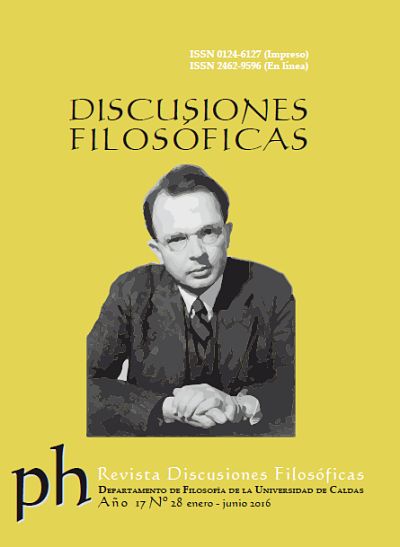Autores/as
Resumen
La principal objeción contra al dualismo cartesiano en filosofía de la mente es que resulta incompatible con la ciencia. Se sostiene, en particular, que el principio de clausura causal del mundo físico y el teorema de preservación de la energía, así como el concepto de interacción dinámica de la física fundamental, desautorizan la postulación de interacciones causales entre sustancias pensantes y sustancias extensas. En este trabajo sostengo que esta conclusión es por lo menos apresurada y que no es un asunto trivial refutar el dualismo cartesiano usando consideraciones empíricas. Mis tesis son: (i) que las críticas antidualistas basadas en premisas científicas colapsan en un reduccionismo metafísicamente implausible y (ii) que la teoría física no excluye la existencia de una relación de causación o interacción dinámica recurrente como la que se requiere para explicar la experiencia consciente, postulando un nexo pertinente entre mentes inmateriales y sistemas nerviosos.
Palabras clave
Citas
Braddon-Mitchell, David & Jackson, Frank. Philosophy of Mind and Cognition. Oxford: Blackwell, 1996. Print.
Broad, Charlie. The Mind and its Place in Nature. London: Routledge & KeganPaul, 1925. Print.
Bunge, Mario. The Mind-Body Problem. Oxford: Pergamon Press, 1980. Print.
Chalmers, Davis. The Conscious Mind. New York: Oxford University Press, 1996. Print.
Donald, Matthew. “Quantum Theory and the Brain”. Proceedings of the Royal Society. 1990: 43–93. Print.
Dowe, Phil. Physical Causation. Cambridge: Cambridge University Press, 2000. Print.
Foster, John. The Immaterial Self: A Defense of the Cartesian Dualist Conception of the Mind. London: Routledge, 1991. Print.
Gibb, Sophie. “Introduction”. Sophie Gibb, Edward Jonathan Lowe & Rögnvaldur Ingthorsson (eds.). Mental Causation and Ontology. Oxford: Oxford University Press, 2013.
Jackson, Frank. “Epiphenomenal Qualia”. Philosophical Quarterly. 1982: 127–136. Print
Kim, Jaegwon. Mind in a Physical World. Cambridge: The MIT Press, 1998. Print.
Lewis, David. “What Experience Teaches”. William Lycan (ed.). Mind and Cognition: A Reader. Oxford: Blackwells, 1990. Print.
Lycan, William. “Philosophy of Mind”. Nicholas Bunnin & Eric TsuiJames (eds.). The Blackwell companion to Philosophy. Oxford: Blackwell Publishers, 1996. Print.
McGinn, Colin. “Can we solve the mind-body problem?” Mind. 1989: 349–366. Print.
Montero, Barbara. “What does the Conservation of Energy Have to Do with Physicalism?” Dialectica. 2006: 383–396. Print.
O’Connor, Timothy & Robb, David. “Introduction”. Timothy O’Connor & David Robb (eds.). Philosophy of Mind: Contemporary Readings. New York: Routledge. 2003. Print.
Rolleri, José. “La Teoría de la Explicación Causal de Salmon y la Mecánica Cuántica”. CRÍTICA, Revista Hispanoamericana de Filosofía. 1997: 3–35. Impreso.
Rosenberg, Gregg. A Place for Consciousness: Probing the Deep Structure of the Natural World. Oxford: Oxford University Press, 2005. Print.
Salmon, Wesley. Scientific Explanation and theCausal Structure ofthe World. Princeton: Princeton University Press, 1984. Print.
Schouten, Maurice. “Theism, Dualism, and the Scientific Image of Humanity”. Zygon. 2001: 679–708. Print.
Stapp, Henry. “Theory of Reality”. Foundations of Physics. 1977: 313–323. Print.
Stephan, Achim. “Armchair arguments against emergentism”. Erkenntnis. 1997: 305–314. Print
Suárez, Mauricio. “Procesos causales, realismo y mecánica cuántica”. Enrahonar. 2005: 141–168. Impreso.
Taliaferro, Charles. Consciousness and the Mind of God. Cambridge: Cambridge University Press, 1994. Print.
Toben, Bob. Space-Time and Beyond. New York: Dutton, 1974. Print.
Van Fraassen, Bas. “The Charybdis of Realism: Epistemological Implications of Bell’s Inequality”. James Cushing & Ernan McMullin (eds.). Philosophical consequences of quantum theory: reflections on Bell’s theorem. Notre Dame: University of Notre Dame Press, 1989. Print.
Wigner, Eugene. “Remarks on the Mind-Body Question”. Irving Good (ed.). The Scientist Speculates. New York: Basic Books, 1962. Print.

 pdf
pdf
 FLIP
FLIP

























